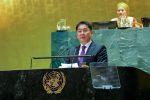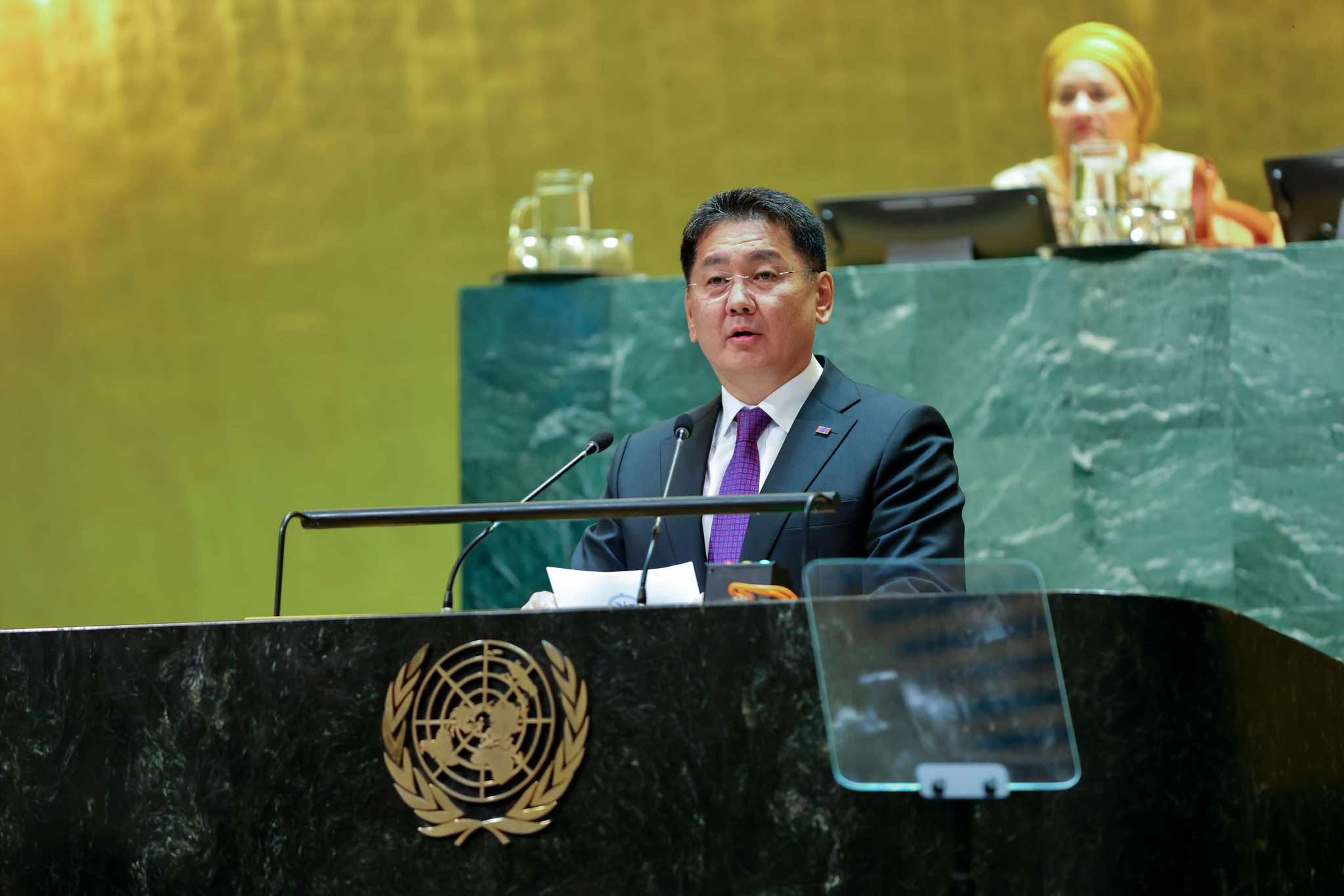FULL ADRRESS BY PRESIDENT KHURELSUKH AT THE GENERAL DEBATE OF THE 79TH SESSION OF THE UN GENERAL ASSEMBLY
President of Mongolia Ukhnaa Khurelsukh addressed the General Debate of the 79th United Nations General Assembly on September 25, 2024. We present the full text of the address of the President.
“Mr. President,
Mr. Secretary-General,
Distinguished delegates,
Ladies and gentlemen,
At the outset, I wish to convey my heartfelt congratulations to the President of the 79th session of the United Nations General Assembly, Your Excellency Mr. Philemon Yang, and wish every success in the work of the session.
Every time I participate in the General Assembly, I take pleasure in observing the sculpture entitled “Consciousness”, created by a renowned Mongolian artist, located in the garden of the UN headquarters.
This sculpture evokes a deep sense of contemplation, reminding us of our responsibilities, consciousness, and dignity before the history of mankind and future generations.
This deeply meaningful work symbolizes the historical moment when countries around the world adopted the UN 2030 Agenda for Sustainable Development and the Paris Agreement on Climate Change.
During my visit this year, the monument stood gloomily, as if demanding answers regarding the goals and commitments we have made for future generations. Unfortunately, as we reach the time to review the implementation of these documents, we find that our efforts and the progress we have achieved are insufficient.
For instance, even though we are halfway to the UN 2030 Agenda for Sustainable Development, the progress on half of all SDG targets is inadequate, with 35 percent stagnating.
In response, UN Secretary-General Antonio Guterres initiated and convened the “Summit of the Future” to review our realities, invigorate the implementation of the Agenda, and intensify our efforts.
At the Summit held just two days ago, we discussed policies, objectives, and scope of cooperation on issues related to sustainable development, science, technology, innovation, youth, and governance transformation.
I am pleased to note that Mongolia actively participated in the negotiation processes for the “Pact for the Future”, “Declaration on Future Generations” and the “Global Digital Compact”, all of which were discussed and adopted at the Summit.
The countries of the world, including ourselves, must work diligently and cooperate to implement these proposed actions.
I am pleased that heads of state, government, and their representatives have fully supported these commitments and actions, expressing their positions from this honourable podium.
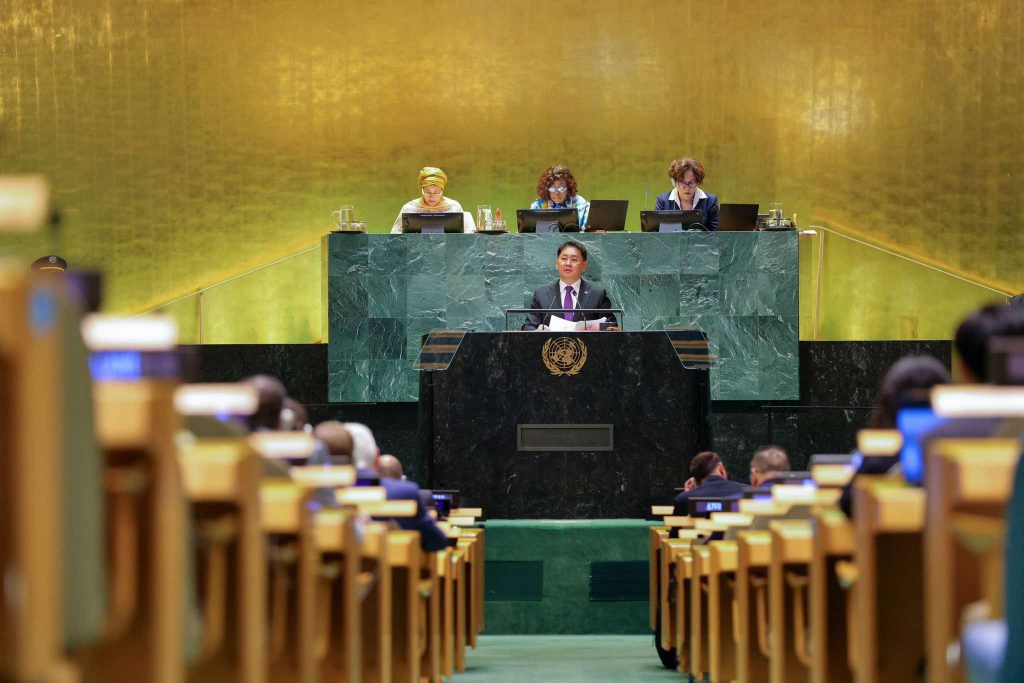
Distinguished delegates,
Our lives are rapidly evolving and developing in an interdependent manner in this age of technological progress and digital advancement.
However, tensions, armed conflicts and wars continue to surge in many parts of the world, with geopolitical tensions rising due to prejudice, extreme ideologies, mistrust, misunderstanding and disrespect.
Mongolia believes that strengthening multilateral cooperation that respects international law and the UN Charter is the primary means to ensure international peace and security, with dialogue, mutual understanding, and trust are the foundations for peaceful and sustainable coexistence.
In order to sustain peace, combat climate change, protect public health, reduce economic inequality, and establish justice, the international community must find optimal solutions and develop creative cooperation that responds to the changing dynamics of our era.
This year, presidential and parliamentary elections were held in over 60 countries, with nearly half of the world’s population casting their votes, making it a year of significant choices.
In Mongolia, parliamentary elections were also conducted, and I would like to highlight that domestic and foreign observers, as well as international organizations, have commended the elections for being successfully conducted within the legal framework.
Mongolia has always aimed to contribute to the international community’s efforts for peace, security, and sustainable development.
In this regard, Mongolia has established diplomatic relations with all member states of the United Nations and is committed to strengthening and developing friendly relations and cooperation with all countries around the globe.
As a nation that consistently pursues a peaceful, open, independent, and multi-pillared foreign policy, Mongolia respects the pluralism that arises from the history, culture, civilization, religion, national interests, and development paths of countries worldwide, and strives to develop international relations based on multi-pillar principles.
Therefore, my country adheres to the principles of the UN Charter, particularly the commitment to refrain from using force against the territorial integrity and political independence of any state. In resolving disagreements and conflicts, we call upon countries and nations worldwide to strictly adhere to diplomatic dialogue instead of confrontation, to promote unity over hostility, and to pursue collective goals rather than divisiveness to cooperate consistently to strengthen global peace and security.
As Mongols, we have a long history of valuing and seeking amicable solutions through dialogue.
For centuries, the Great Mongol Empire employed political and diplomatic methods, such as sending and receiving ambassadors and envoys, concluding agreements, fostering friendships, and seeking consensus, in its relations with nations near and far, allies, and adversaries as well in order to resolve conflicts peacefully. It continues to be a cornerstone of Mongolia’s foreign policy to date.
The “Gerege” serves as historical proof of this legacy; which represents the origins of diplomatic credentials and modern diplomatic passports, and has been utilized by Mongols since the 13th century in relations between countries.
This historic “Gerege” is preserved as a historical monument at the United Nations headquarters. In 2000, UN Secretary-General Kofi Annan remarked that the “Gerege” is an invaluable heritage gifted by Mongols to the international community, emphasizing that we have a lot to learn from the wisdom of Mongolian ancestors.
The principle of maintaining peace and harmonious coexistence upheld by our ancestors reflects the progressive ideals that underpin our current collective efforts to sustain peace and stability.
At present, humanity is alarmed by the deepening global geopolitical tensions, which could ignite the fires of war and heighten the nuclear threat.
The joint efforts of countries worldwide toward non-proliferation, disarmament, and the complete elimination of nuclear weapons, as well as the expansion of nuclear-weapon-free zones, should not be overlooked.
Mongolia has made significant contributions to the elimination of nuclear threats, by having its nuclear-weapon-free status recognized on an international level. We reaffirm our commitment to continue pursuing and supporting nuclear-weapon-free policies and initiatives.
Mongolia calls upon all countries to collaborate in ensuring peace and stability, particularly in creating a world free from nuclear threats, and proposes the convening of a special gathering on this issue within the framework of the United Nations.
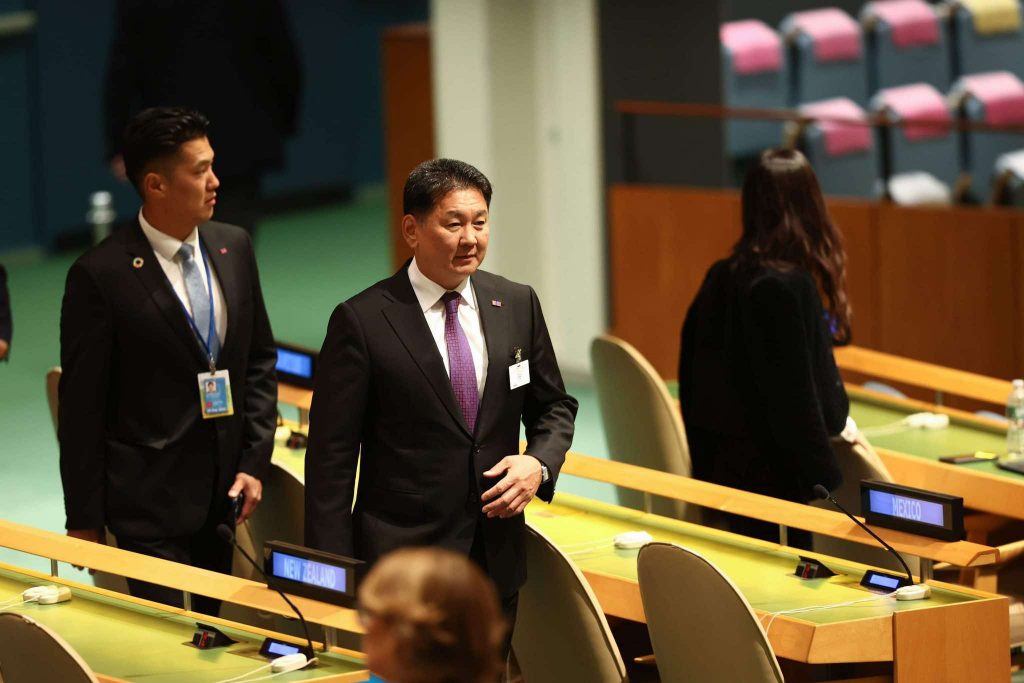
Mr. President,
Mongolia highly appreciates the role of UN peacekeepers, the “blue helmets,” who work tirelessly and have made significant contributions to global peace and security.
Due to various factors, such as international terrorism, brutal acts of extremism, and the increasing number of refugees, blue helmets face more complex tasks in increasingly difficult conditions.
We must not forget that over 4,370 UN peacekeepers, including military, police, and civilian personnel, have lost their lives in the line of duty.
Although Mongolia has a relatively small population, over the past 20 years, more than 20,000 peacekeepers have been deployed to hotspots around the world to contribute to the peace and security of humanity.
In particular, in alignment with the Women, Peace and Security Agenda of the UN Security Council, we aim to increase women’s participation in UN peacekeeping operations. Currently, the proportion of female officers among our peacekeepers is 11 percent.
To ensure the competence of our peacekeepers, it is crucial to improve their psychological well-being. Therefore, Mongolia initiated and developed a “Pilot Project for Support Peacekeepers and their Families,” which was submitted to the United Nations Department of Peacekeeping Operations in December last year.
I am confident that this initiative will receive full support from the United Nations Department of Peacekeeping Operations and other troop-contributing countries.
Mr. President, distinguished delegates,
In recent years, the rapid development of information and communication technologies has significantly impacted the daily lives of people and is being considered as a factor that may fundamentally change the development of civilization in the future.
In line with this, intensive discussions on information and communication technologies and artificial intelligence have arisen in the international fora, and the recently adopted “Global Digital Compact’’ is a timely and essential step.
Our country aims to keep pace with the development of information technology, placing great importance on UN resolutions, documents, and other international legal discussions related to this issue, and actively participating in them.
Developed countries are making substantial investments and funding in the field of artificial intelligence, which is clearly increasing the income and power disparities among nations.
Therefore, we express our commitment to actively support initiatives aimed at enhancing international cooperation and unified regulation in this high-cost, high-risk sector, ensuring equal access, and sharing experiences.
In March of this year, the UN General Assembly adopted a resolution calling on member states to ensure the reliability and security of artificial intelligence for the first time, which is a significant step forward.
To accelerate the implementation of the Sustainable Development Goals, countries around the world are focusing on policies that promote economic diversification, energy and digital transitions, reduce the negative impacts of climate change, enhance adaptive capacity, and increase access to essential social services, particularly in education and health, while also prioritizing employment and food security.
On the other hand, global debt accumulation has reached unprecedented levels, with debt service payments in developing countries exceeding the amounts borrowed, further constraining the budgetary space needed to implement sustainable development goals.
Mongolia fully supports the international community’s efforts to not only ensure debt sustainability but also fundamentally reform the international financial system under the initiatives outlined in the UN Secretary-General’s report, “Our Common Agenda.”
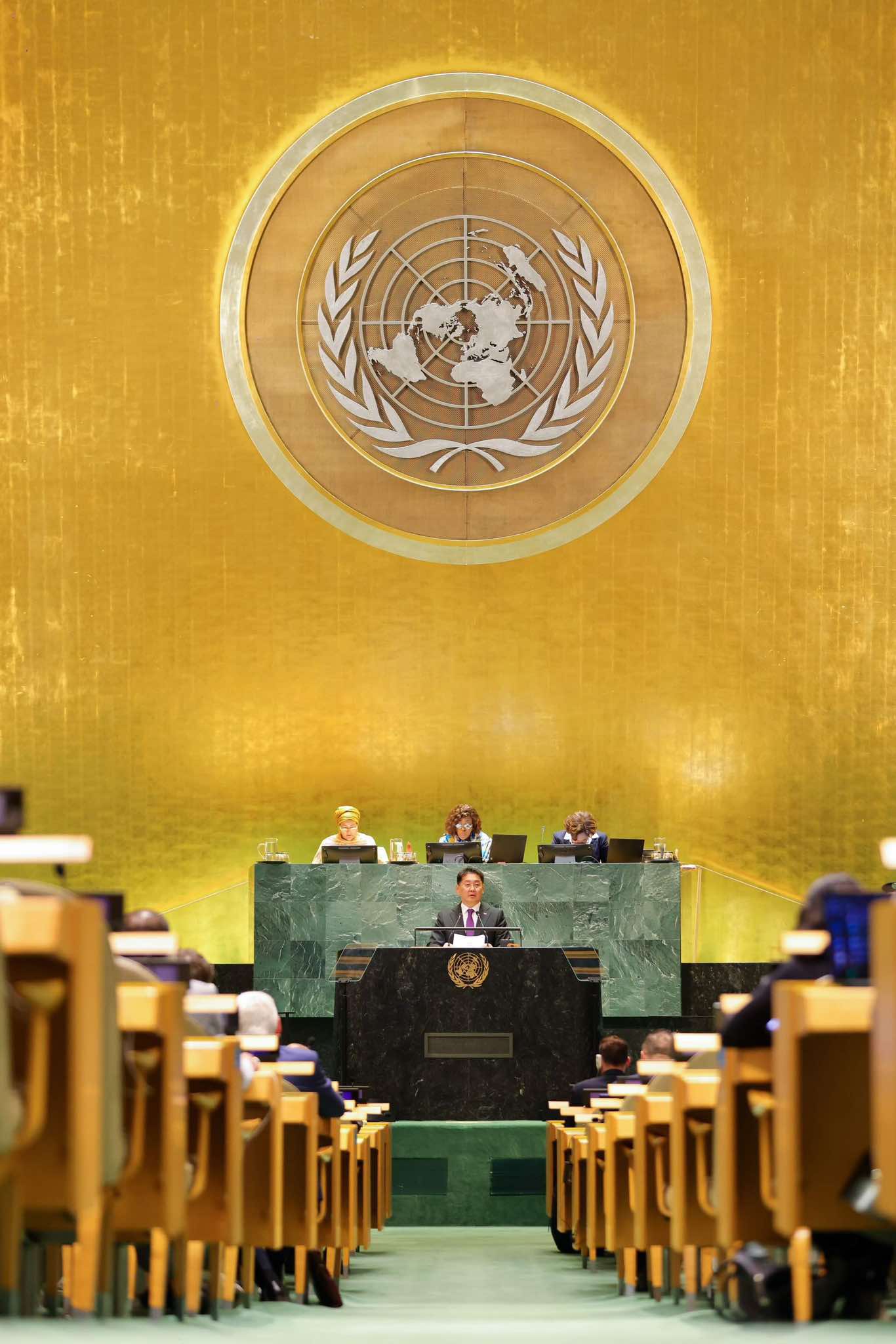 Distinguished delegates,
Distinguished delegates,
In the early years of the 21st century, ideologies and conflicts that divided the world became history, while traditional military threats receded and non-traditional threats such as climate change, pandemics, terrorism, cybercrime, and refugees gained increasing attention.
However, this situation has changed drastically in recent years, with traditional threats resurfacing and negatively impacting global security and sustainable development.
In other words, the overlap and expanding scope of both traditional and non-traditional threats require countries around the world to pay special attention and strengthen their collaborative efforts.
In particular, global warming and climate change have transcended natural and economic boundaries, exacerbating sensitive social issues and disputes over resources, and triggering migration that bring numerous direct and indirect dangers and risks.
If this situation continues, humanity will face not just a choice between development or stagnation, but rather a choice between existence and non-existence.
Therefore, we must carefully assess the situation and recognize the need for smart solutions based on the advancements of our era, as well as the implementation of new technologies, and share good practices while collaborating to overcome the challenges posed by climate change.
As descendants of nomads, we, Mongols, have preserved and honoured our unique cultural heritage and traditions to this day.
The origin of our nomadic civilization is, in fact, the philosophy of green development, which emphasizes caring for and protecting nature while responsibly utilizing its benefits. This indicates that we have substantial traditional wisdom and initiatives regarding the future of green development.
Thus, in line with the goals of sustainable development, Mongolia has been successfully implementing national movements and programs such as “Vision 2050,” “One Billion Trees,” “Food Security and Safety,” “Healthy Mongolia,” and “Digital Mongolia.”
These initiatives represent our contributions at international and regional levels to achieving the Sustainable Development Goals.
Additionally, I am pleased to announce that Mongolia, through its initiative, is preparing to ensure the implementation of the resolution adopted by the UN General Assembly declaring 2026 as the International Year of Rangelands and Pastoralists. We are also set to host the 17th Conference of the Parties to the United Nations Convention to Combat Desertification in Ulaanbaatar in 2026.
I am confident that the international community and member states will support and collaborate with us in these efforts.
Mr. President,
Our country, with its unique location on the Central Asian plateau, its harsh climate, and its status as a landlocked nation, has consistently paid special attention to the issues faced by countries in similar situations with common challenges, actively collaborating with them to protect our interests and make a tangible contribution to amplifying our voices on the global stage.
Mongolia, in partnership with Austria, co-chaired the Preparatory Committee preparing for the Third United Nations Conference on Landlocked Developing Countries (LLDCs) for 2023–2024 and successfully facilitated discussions on the draft outcome document among member states.
We are pleased that the draft of the Action Programme to be adopted at the upcoming conference in Botswana in December includes innovative content outlining specific goals and measures to guide the development of LLDCs over the next decade.
Therefore, we urge all LLDCs, transit countries, and all UN member states and development partners to engage at a highest level in the Third UN Conference on LLDCs and to discuss proposals creatively for the successful implementation of the Action Programme.
Mr. President,
At the Fourth World Conference on Women held in Beijing in 1995, it was proclaimed that “women’s rights are human rights, and human rights are women’s rights,” setting forth the significant goal of eliminating barriers to gender equality on the global stage.
We, Mongols, have a long-standing culture and tradition of honouring and respecting women, with a history of Mongolian queens and women playing crucial roles in the governance and social affairs of the country.
This rich tradition and cultural heritage have continued to strengthen and develop, making Mongolia one of the leaders in ensuring gender equality in Asia.
In its first Constitution, Mongolia was the first in Asia to guarantee equal rights for women, including the right to vote and be elected. This year marks the 100th anniversary of the establishment of the national organization for Mongolian women – Mongolian Women’s Union.
On the threshold of this historic anniversary, in 2023, legal and policy reforms aimed at increasing women’s participation in decision-making at social and political levels were implemented.
As a result, in the recent parliamentary elections, 25.4% of all elected members were women, surpassing the average rate of 21.2% in Asia.
Moreover, in August of this year, our country successfully hosted the World Women’s Forum in Ulaanbaatar in collaboration with the UN, under the theme “Towards a Greener Future.”
This forum brought together women leaders from governments, international organizations, and influential representatives from various sectors – social, economic, and cultural – across five continents. They proposed numerous creative initiatives to enhance women’s roles and contributions in the context of sustainable development goals, including economics, environment, climate change, food security, education, sports, culture, and the arts. It is a pleasure to note that the “Ulaanbaatar Declaration: Towards a Sustainable Future” was adopted as the outcome document.
Building on the momentum of the World Women’s Forum, Mongolia will continue to actively work on gender equality and the empowerment of women.
Mr. President, distinguished delegates,
The General Assembly of the United Nations is the most important and honorable platform for spreading the voice of ideas and aspirations for world peace, security, welfare and development of mankind.
Mongolia has consistently supported the efforts of member states to reform the UN Security Council into a more equitable, accessible, transparent, effective, democratic and responsible system.
We also strongly support the further strengthening of the United Nations’ central role and coordination in global affairs.
Our country believes that any international challenges and misunderstandings should be addressed through mutual understanding, mutual trust, mutual respect, and dialogue, and should be resolved within the framework of international legal norms.
Therefore, I call on you, Heads of State and Government and distinguished delegates, to demonstrate exceptional leadership and make a meaningful contribution to strengthening trust, mutual respect and cooperation among the nations of the world in the vital work of achieving world peace, security, sustainable development and the well-being of humanity.
May the eternal blue sky bless us with peace across the world.
Thank you for your attention!”

